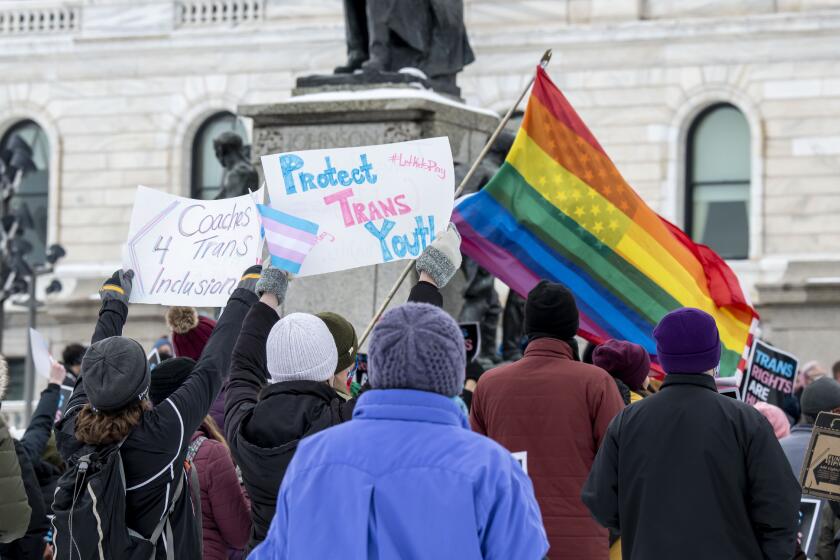A gay couple’s messy surrogacy journey is just the start of this very funny novel

- Share via
Book Review
Something Close to Nothing
By Tom Pyun
Bywater Books: 250 pages, $19.95
If you buy books linked on our site, The Times may earn a commission from Bookshop.org, whose fees support independent bookstores.
I love debut novels that feel stuffed with every idea an author has been waiting to express. Tom Pyun’s “Something Close to Nothing” feels like one of those books. It begins as the story of a gay couple’s tragicomic surrogacy journey but then expands into much more.
It’s no spoiler to tell you that one half of the couple, Wynn, bolts before the baby is even born. And when I say bolts, I mean he physically runs out of the airport and leaves his partner, Jared, moments before they’re meant to board a flight to Cambodia for the birth of their daughter, whom they plan to name Meryl after the award-winning actress. That memorable scene sets up many more jaw-dropping plot twists.

Told through Wynn‘s and Jared’s alternating points of view, this is a restless novel about restless people whose American dreams are rarely satisfied. Pyun takes us to San Francisco, Cambodia, Thailand, Connecticut, New York, Switzerland, Boston and Kenya. He begins the story in 2015 but takes us as far back as 1995 and as far into the future as 2036, all in a slim and breathless 250 pages. This is a novel that moves fast.
Sometimes I felt the book moved too fast, that its plot twists were resolved before they had time to fully unravel. The book shines brightest when it lingers in the messes its characters create, and when it takes time to examine their passions and fears. Wynn’s love of dance, for example, is written with patient complexity. Early on, he describes his ability “to disassociate and go through the motions when needed” — what a way to set up a character who later abandons his life to chase his thirst for dance, which is all about “the unbridled joy of being in my body.” In this novel, dance is the opposite of disassociation. It’s freedom, community, belonging — a refuge, especially for Wynn, a character in a state of constant motion who declares early on that he doesn’t “want to feel empty anymore.”
Terms like “social transition” give parents inaccurate ideas that queer kids are being lured onto an irreversible pathway toward medical intervention.
Crucially for the story Pyun is telling, Wynn wants to be a hip-hop dancer. He describes hip-hop as “resistance, especially within the white supremacist capitalist patriarchy that we live in.” The novel excels when exploring the role this patriarchy plays in shaping both characters’ views of themselves and their world. Wynn, a Korean American born and raised in Connecticut, spent his first 18 years being “routinely assaulted and ignored, sometimes on the same day,” by classmates and residents of his hometown. He makes two promises to himself when he graduates college, one being that he “wouldn’t end up with a white man.” In a brilliant moment of introspection, he later says, “The fatal flaw of this contract was its rooting in the negative. As they say, ‘If you don’t build your dream, someone will hire you to build theirs.’”
And so, Wynn does end up with a white man … one he eventually runs away from in the airport. And Jared is not just any white man, but one who imagines a future where Wynn’s escape becomes an anecdote for their dinner guests, “a well-to-do, racially diverse mix of middle-aged, straight, and gay professional couples.”
I feel compelled to confess. That belly dancer in my 9th grade history class in 1982 at my L.A. magnet? I hired her. My bad.
I should note that I am an Iranian American gay husband and father who was gifted our beloved children through surrogacy. I know from my teen years as an immigrant in this country what it feels like to be both assaulted and ignored on the same day. I know too what it means to find freedom, community and belonging through the arts. I also understand the unique pressure of wanting to be a perfect example of parenthood in a world that still views queer parents with suspicion. There were moments in this novel where I cheered its wisdom and humor (the book is very, very funny, never more so than when we finally meet Wynn and Jared’s surrogate), and moments where I cringed at how selfish its main characters are in regard to their commitment as parents.
It’s not until the acknowledgments, where Pyun thanks the queer friends who shared their surrogacy journeys with him, that we hear a positive story of queer parenthood. He writes, “The happiness of your households made poor fodder for the juicy novel I so desperately wanted to write.” Wynn and Jared do not exist to represent perfect depictions of queerness. They exist to show us that queer parents-to-be can be just as messed up, conflicted and impulsive as any others. Wynn might be the one who physically runs away from parenthood and prays their surrogate changes her mind or miscarries, but Jared is an equally unprepared parent who at one point thinks of leaving the baby himself to start over “with a California-based surrogate this time.”
Ultimately, this is a novel about the darkly hilarious side of our never-satisfied American dreams. What feels most American about it is how stuffed it is with ideas and energy, with rage and hope, with rash and selfish decisions that leave chaos and hurt in their wake.
As Americans consider our most recent existential election and multiple global crises that should inspire us to face our complicity in shaping an unjust world, “Something Close to Nothing” asks some big questions of us as well as of its characters: Will we run away from our responsibilities to others? Can we truly help someone else when we haven’t yet examined and accepted ourselves? And perhaps most important: Should we name our next child after Meryl Streep?
Abdi Nazemian is a writer whose books include the Stonewall Honor recipient “Like a Love Story” and the Stonewall Award- and Lambda Literary Award-winning “Only This Beautiful Moment.”
More to Read
A cure for the common opinion
Get thought-provoking perspectives with our weekly newsletter.
You may occasionally receive promotional content from the Los Angeles Times.












